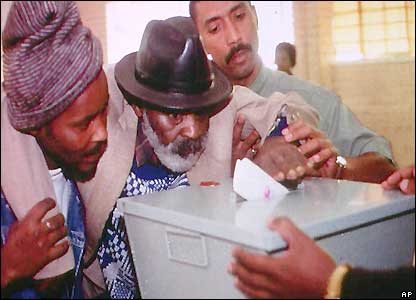OUR GENERATION'S JIM CROW LAWS

Denied
I do not exaggerate when I say that we are literally in the midst of the systematic decimation of American democracy.
In yesterday's 6-3 decision in Crawford v. Marion County Election Board, the Supreme Court refused to recognize any constitutional flaws with Indiana's
By sheer coincidence, I also watched the compelling short documentary, Freedom To Vote: Protecting The Ballot, at the Newport Beach Film Festival yesterday. Reading the opinion before watching that was a bit like walking into a horror movie in which you know that every person on the screen is going to die before the credits roll.
As the documentary pointed out, our nation's history is a story of the struggle for the right to vote. But only in the last few years are our government leaders fighting to prevent people from voting.
To my disappointment, few seem alarmed or enraged by the proliferation of Voter ID laws. The common thinking is: What's the big deal? We need to stop voter fraud and, besides, one needs a driver's license to do many things like board a plane, open a bank account, etc.
The big deal is that 20 million people just became potentially disenfranchised as a result of yesterday's Supreme Court decision.
The big deal is that most of the disenfranchised are people of color (mostly African American), elderly, disabled and/or poor people, who tend to vote for Democratic candidates and causes.
The big deal is that these Voter ID laws are enacted because the reactionary right-wing forces of our country are intentionally trying to deprive those groups from voting.
The big deal is that 20% of black voters in Indiana do not currently have a valid photo ID.
The big deal is that almost none of the enacted or proposed Voter ID laws provide measures to help voters obtain the necessary identification or offer alternative ways of voting.
The big deal is that these laws are being passed despite no nationwide widespread evidence of fraud caused by voter impersonation. (In Indiana, there was literally not one reported incident of fraud, which the Supreme Court acknowledged.)
The big deal is that our courts seem interested in a nonexistent form of voter fraud, but could not care less about more widespread evidence of voter fraud in Florida (2000), Ohio (2004), or the New York primary (2008). (Did you realize that not one vote in Harlem went to Obama in the most recent Democratic primary?)
While the Court's decision may not fundamentally alter the 2008 landscape, it will surely eviscerate enough votes in 2010 and beyond to tilt the outcome of any election.
Which is to say, the Supreme Court just handed yet another election to the Republicans.
For the skeptics and critics, let me just say that I understand that, technically, no citizen has been denied the right to vote.
But countless studies have confirmed that the hurdles for those without driver's licenses are immense and unappreciated by those of us who drive every day. Those without licenses will have a difficult time procuring the birth certificates or passports necessary to get one. The documentary I watched yesterday noted how some African American citizens in Georgia were born during an era in which they were not granted birth certificates. Thus, the costs alone are enough to discourage people from going through the trouble.
Reading the Crawford opinion made me appreciate what it must have felt like in 1896 to read Plessy v. Ferguson.
The difference between 1896 and 2008 is that everyone understood the impact of Plessy. But the magnitude of Crawford (and the voter ID laws yet to come) will never be fully appreciated.
Labels: 2008 presidential election, disenfranchisement, Supreme Court


